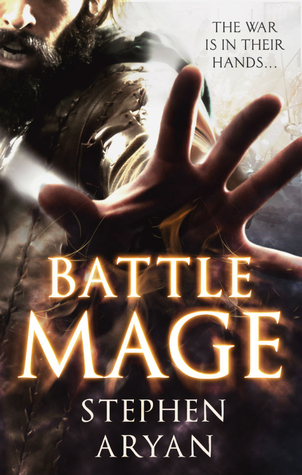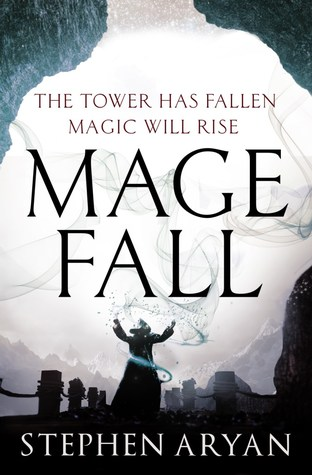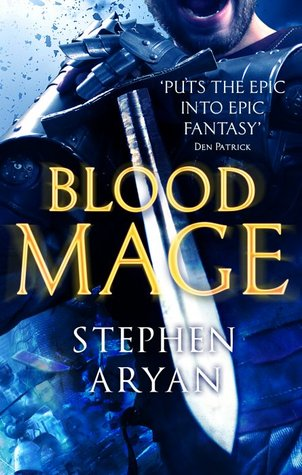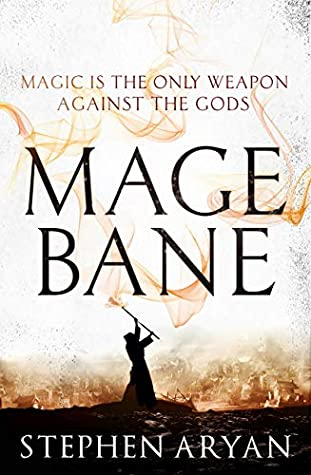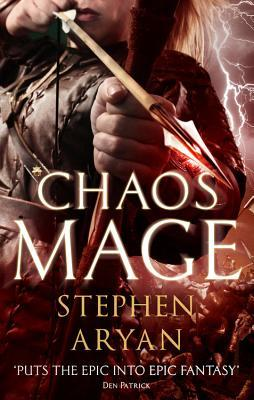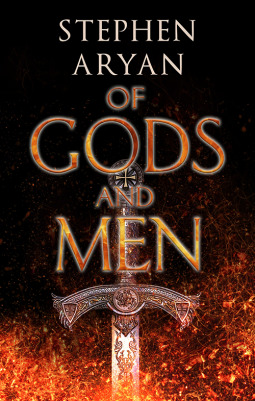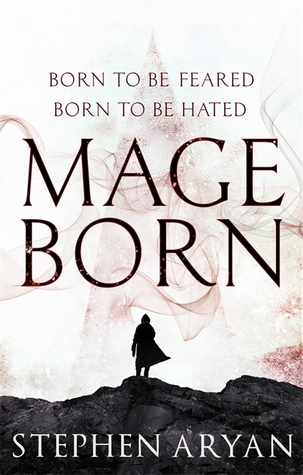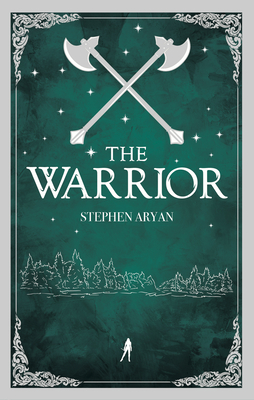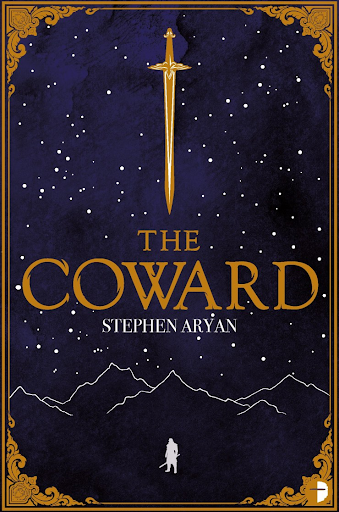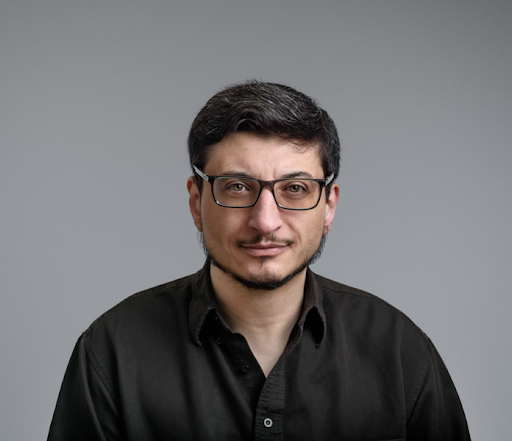Six Elementals Author Interviews will introduce prospective readers to some of the best writers in their genre you may, or may not, have heard of, via a series of six questions. I encourage you to check out the work of these phenomenal creatives! Links to their websites and purchase links will always appear, accompanying the interview. Check them out!
I am honoured to be interviewing a very popular writer in the fantasy genre, rising star Stephen Aryan! Stephen's currently published works include: Age of Darkness Trilogy; Age of Dread Trilogy; The Coward - Book One of the Quest for Heroes Duology; and the novella Of Gods and Men.
P.L.: Such a privilege to be able to interview you, Stephen! Welcome to Six Elementals Interviews! I thoroughly enjoyed The Coward and am very excited to see that the sequel, The Warrior, is coming soon!
You are now a veteran of the fantasy author scene, a well established writer with a reputation for excellence. You've already published two complete trilogies and the first book of a new duology has been released.
You are a David Gemmell Morningstar Award Nominee for Best Fantasy Newcomer in 2016 for your debut novel Battlemage, first book of your Age of Darkness trilogy. You are also known in the writing community for your outstanding YouTube videos, designed to help aspiring authors. https://www.youtube.com/c/StephenAryan44
In many of those videos you provide advice for writers trying to navigate the world of traditional publishing, including querying literary agents, obtaining a book deal, and other extremely important elements of the journey to becoming traditionally published. You have also written about this topic too in a Kindle e-book called "Good and Bad Advice About Writing and Getting Traditionally Published".
By all nominal measures, you are very successful as an author, to the point where others in the industry look to you for guidance. Still, even for an established and successful author such as yourself, does self-doubt ever creep up on you, the same way it affects many other creatives? Have you ever experienced imposter syndrome?
Stephen: I appreciate the kind words and the short answer regarding self doubt is yes. It is always there. It never goes away and if it did, I would be concerned because then I could be accused of phoning it in. If I no longer cared about the material and was confident that my work was always going to be amazing, that's a serious problem. Also, I'm only ever as good as my last book. Readers expect the same, but different, but equally awesome or better next time. So, every time I sit down to write a new book I wonder, how did I do it last time and can I do it again? I also have a phase with every book, where I'm certain that it is the worst thing I've ever written. But, now that I've done it a few times, I know that phase will pass and once I get over that hump, I feel ok.
P.L.: One of the things I loved about your book, The Coward, was your blistering combat scenes. I understand you have served in the military, and my assumption was that your experience in the armed forces helped bring authenticity to the fictional battles you create. Is this true? What goes into making the gripping battle scenes that you write?
Stephen: No, I've never served in the military, but members of my family have been in the Armed Forces, specifically the Navy and Royal Air Force. People have said in the past that my battles scenes feel real and immersive, and I take that as a huge compliment. My goal is to make the reader worry about the fate of the characters. In the heat of a battle, it's intense and at any second, someone could die. But not just because, on that particular day, their opponent is better. It could be that they trip over something on the ground, or they get mud in their eye, or they've got a bad belly, so haven't eaten for days and have no energy to fight. They could have something on their mind so they're distracted. There's a hundred reasons someone might die. Totally ungraceful, awful, ridiculous reasons that are not glorious. I try to put the reader right in the middle of the action, so they see, smell, hear and even taste the action. From the mud to the blood to the stench of death. The stakes are real and hopefully relatable, even if you've never been in a a fight to the death. That's a lot more interesting to me than someone sat at the edge of a valley, moving units around like pieces on a chess board, where they are never actually at risk.
P.L.: I found the whole concept of The Coward fascinating. You take a comfortable and beloved fantasy trope - the sage veteran, reluctant hero (Kell) of many sagas who is signed up for one last impossible quest - and does something very interesting and unique with it. The back cover blurb highlights this, and it has really resonated with me, and a lot of other readers, judging by the popularity of the book. The one line that sticks in my head is the hook, "Everyone puts their faith in Kell, the Legend, but he's just a coward who has no intention of risking his life for anyone..." What inspired you to write a book about this kind of protagonist?
Stephen: We all have heroes. People we look up to and respect, but often there's the persona that is presented to the public, and then there's the real person. No one is perfect. Everyone has flaws. Also, that old saying 'history is written by the victors' was ringing in my mind. Kell was the only one to return from his first adventure to the ice, which happened ten years before the start of the story. So who is to say what is really happened other than him? No one really knows. In the story, a useful song was created by a bard, part propaganda, part mythology, to inspire people, to make them feel safe and to give them a perfect hero. So status and celebrities were also on my mind, especially nowadays as a lot of people want their 15 minutes of fame. So, as you said, it's about expectations versus reality. What really makes someone a hero?
The other main aspect of the story is about people coming home from war. I read some non-fiction accounts of soldiers and journalists who went into some of the worst places on Earth, to fight or bring us the news, so we at home could see what was really happening. In my lifetime I've seen a lot of wars on the news, and many of the people who make it back have PTSD. In The Coward, Kell was scarred by his experience and has spent the last ten years trying to come to terms with what happened. The dreams of glory, riches and fame mean nothing to him now. Those were the childish fancies of a teenager. But now the King wants him to go north and do it again. To revisit his nightmares and open old wounds and who can blame him for not wanting to go.
So, on the surface, it's a quest story with monsters and adventure, but it's not about that at all.
P.L.: My favourite character in The Coward by far though was Britak, the Reverend Mother, leader of the Shepherd faith, who is the other main POV to contrast with Kell. This papal-like figure is no benevolent ruler of her religion. She oversees with an iron fist, a hand ready to cut out any and all opposition to her church decisively, like a gangrenous wound. What went into creating such a compelling, twisted character, who is a sinister, religious fanatic? What was the impetus to make Britak that way?
Stephen: I think it's important to question that which is important to us and not blindly follow anything. Science is tested, again and again, as part of the process of proving a theory. Obviously, faith plays an important role in the lives of many people, so I think it should also be challenged. A lot of readers think the Reverend Mother is evil, but look at it from her perspective. The teachings of the Shepherd encourage people to share with those less fortunate, to be compassionate, and to help your neighbour if they are in need. Sound familiar? But in the Five Kingdoms people have become distracted. Instead of working together and helping one another, they've become fascinated and focused on unattainable goals. Such as a mythical figure, who doesn't really exist. A hero who saved the world.
Ten years before the story of The Coward, the weather took a turn for the worst, but instead of pulling together and preparing for a tough year ahead, the people waited for a hero to save them. They passed the responsibility onto someone else and blamed it on a supernatural being, rather than just bad weather. The next year, the weather improved and the people thought Kell had saved the world from a mysterious evil, but did he really? Where is the proof?
Then, ten years later, the weather changes again for the worse, and once more, the people look to someone else to save them. The Reverend Mother knows that people are stronger together and the Shepherd's teachings are the best way for the Five Kingdoms to flourish. Her belief is absolute and she will no tolerate any nonsense about the supernatural. So she's willing to do whatever is necessary for the greater good which some will view as fanatical.
P.L.: Who are some of your favourite authors? What are you currently reading?
Stephen: The answer to my favourite author never tends to change, it's always David Gemmell. Also my foundation in fantasy is much like a lot of other people of a similar age. I grew up reading Tolkien, C.S. Lewis, Weis and Hickman, David Eddings, Terry Brooks, Ursula Le Guin and so on. However, I've read a lot of great books in the last 20 years. Recent books that have stood out are Blackwing by Ed McDonald, The Blacktongue Thief by Christopher Buehlman, The Winternight trilogy by Katherine Arden, Blackhawks by David Wragg, Blood Upon the Sand by Bradley P. Beaulieu, Priest of Lies by Peter McLean, We Are the Dead by Mike Shackle, The Grey Bastards by Jonathan French, the list goes on and on. I'm currently reading The Righteous by David Wragg, book 2 of his duology.
P.L.: With your experience and knowledge, where do you predict the traditional publishing industry is headed? While traditional publishing is still considered the most lucrative (certainly the most prestigious) avenue to publish speculative fiction, there has been a recent proliferation of successful self-published authors.
Self-publishing is attaining more viability, credibility, and exposure. In general, top self-published authors such as Will Wight seem to be gaining acclaim and sales that can rival the average traditionally-published counterpart. Big traditional houses are increasingly amalgamating, "zero advances" have been witnessed in recent years, and it seems to be more and more competitive in terms of securing an agent and a book deal. What does your crystal ball tell you about what traditional publishing will look like in the next decade?
Stephen: Predicting where the industry will go is difficult. In general terms, I think self publishing will continue to flourish and traditional publishers will continue to offer contracts to authors who self publish something unique, interesting and popular. The origin of these books is changing all the time. It used to be authors who had originally self published or those on Amazon. Now it's grown to include finalists and winners of competitions like the SPFBO, to recently, people who have had success on TikTok. I think traditional publishers will continue to take risks and seek out diverse voices and people with an interesting perspective, but beyond that, I have no ideas about future trends.
P.L.: Stephen, it has been an honour to speak to you for Six Elementals Interviews! Thank you so much!
Buy The Coward here
https://www.amazon.com/Coward-Book-Quest-Heroes-ebook/dp/B08HY22VZ3/ref=sr_1_1?crid=2OGIIMM612NCJ&keywords=the+coward+stephen+aryan&qid=1653949791&sprefix=The+Coward+%2Caps%2C320&sr=8-1
Buy The Age of Darkness Trilogy here
https://www.amazon.com/gp/product/B00RTY0D7U/ref=dbs_a_def_rwt_hsch_vapi_tkin_p1_i0
https://www.amazon.com/gp/product/B013HA6WCO/ref=dbs_a_def_rwt_hsch_vapi_tkin_p1_i1
https://www.amazon.com/gp/product/B01GGJJ6EE/ref=dbs_a_def_rwt_hsch_vapi_tkin_p1_i6
Buy The Age of Dread Trilogy here
https://www.amazon.com/gp/product/B01N4W6IEG/ref=dbs_a_def_rwt_hsch_vapi_tkin_p1_i3
https://www.amazon.com/gp/product/B078W54WQG/ref=dbs_a_def_rwt_hsch_vapi_tkin_p1_i4
https://www.amazon.com/gp/product/B07K6JVKP9/ref=dbs_a_def_rwt_hsch_vapi_tkin_p1_i5
Buy Of Gods and Men here
https://www.amazon.com/gp/product/B0756BN8GC/ref=dbs_a_def_rwt_hsch_vapi_tkin_p1_i8
Website: www.stephen-aryan.com
Twitter: @SteveAryan
I am honoured to be interviewing a very popular writer in the fantasy genre, rising star Stephen Aryan! Stephen's currently published works include: Age of Darkness Trilogy; Age of Dread Trilogy; The Coward - Book One of the Quest for Heroes Duology; and the novella Of Gods and Men.
P.L.: Such a privilege to be able to interview you, Stephen! Welcome to Six Elementals Interviews! I thoroughly enjoyed The Coward and am very excited to see that the sequel, The Warrior, is coming soon!
You are now a veteran of the fantasy author scene, a well established writer with a reputation for excellence. You've already published two complete trilogies and the first book of a new duology has been released.
You are a David Gemmell Morningstar Award Nominee for Best Fantasy Newcomer in 2016 for your debut novel Battlemage, first book of your Age of Darkness trilogy. You are also known in the writing community for your outstanding YouTube videos, designed to help aspiring authors. https://www.youtube.com/c/StephenAryan44
In many of those videos you provide advice for writers trying to navigate the world of traditional publishing, including querying literary agents, obtaining a book deal, and other extremely important elements of the journey to becoming traditionally published. You have also written about this topic too in a Kindle e-book called "Good and Bad Advice About Writing and Getting Traditionally Published".
By all nominal measures, you are very successful as an author, to the point where others in the industry look to you for guidance. Still, even for an established and successful author such as yourself, does self-doubt ever creep up on you, the same way it affects many other creatives? Have you ever experienced imposter syndrome?
Stephen: I appreciate the kind words and the short answer regarding self doubt is yes. It is always there. It never goes away and if it did, I would be concerned because then I could be accused of phoning it in. If I no longer cared about the material and was confident that my work was always going to be amazing, that's a serious problem. Also, I'm only ever as good as my last book. Readers expect the same, but different, but equally awesome or better next time. So, every time I sit down to write a new book I wonder, how did I do it last time and can I do it again? I also have a phase with every book, where I'm certain that it is the worst thing I've ever written. But, now that I've done it a few times, I know that phase will pass and once I get over that hump, I feel ok.
P.L.: One of the things I loved about your book, The Coward, was your blistering combat scenes. I understand you have served in the military, and my assumption was that your experience in the armed forces helped bring authenticity to the fictional battles you create. Is this true? What goes into making the gripping battle scenes that you write?
Stephen: No, I've never served in the military, but members of my family have been in the Armed Forces, specifically the Navy and Royal Air Force. People have said in the past that my battles scenes feel real and immersive, and I take that as a huge compliment. My goal is to make the reader worry about the fate of the characters. In the heat of a battle, it's intense and at any second, someone could die. But not just because, on that particular day, their opponent is better. It could be that they trip over something on the ground, or they get mud in their eye, or they've got a bad belly, so haven't eaten for days and have no energy to fight. They could have something on their mind so they're distracted. There's a hundred reasons someone might die. Totally ungraceful, awful, ridiculous reasons that are not glorious. I try to put the reader right in the middle of the action, so they see, smell, hear and even taste the action. From the mud to the blood to the stench of death. The stakes are real and hopefully relatable, even if you've never been in a a fight to the death. That's a lot more interesting to me than someone sat at the edge of a valley, moving units around like pieces on a chess board, where they are never actually at risk.
P.L.: I found the whole concept of The Coward fascinating. You take a comfortable and beloved fantasy trope - the sage veteran, reluctant hero (Kell) of many sagas who is signed up for one last impossible quest - and does something very interesting and unique with it. The back cover blurb highlights this, and it has really resonated with me, and a lot of other readers, judging by the popularity of the book. The one line that sticks in my head is the hook, "Everyone puts their faith in Kell, the Legend, but he's just a coward who has no intention of risking his life for anyone..." What inspired you to write a book about this kind of protagonist?
Stephen: We all have heroes. People we look up to and respect, but often there's the persona that is presented to the public, and then there's the real person. No one is perfect. Everyone has flaws. Also, that old saying 'history is written by the victors' was ringing in my mind. Kell was the only one to return from his first adventure to the ice, which happened ten years before the start of the story. So who is to say what is really happened other than him? No one really knows. In the story, a useful song was created by a bard, part propaganda, part mythology, to inspire people, to make them feel safe and to give them a perfect hero. So status and celebrities were also on my mind, especially nowadays as a lot of people want their 15 minutes of fame. So, as you said, it's about expectations versus reality. What really makes someone a hero?
The other main aspect of the story is about people coming home from war. I read some non-fiction accounts of soldiers and journalists who went into some of the worst places on Earth, to fight or bring us the news, so we at home could see what was really happening. In my lifetime I've seen a lot of wars on the news, and many of the people who make it back have PTSD. In The Coward, Kell was scarred by his experience and has spent the last ten years trying to come to terms with what happened. The dreams of glory, riches and fame mean nothing to him now. Those were the childish fancies of a teenager. But now the King wants him to go north and do it again. To revisit his nightmares and open old wounds and who can blame him for not wanting to go.
So, on the surface, it's a quest story with monsters and adventure, but it's not about that at all.
P.L.: My favourite character in The Coward by far though was Britak, the Reverend Mother, leader of the Shepherd faith, who is the other main POV to contrast with Kell. This papal-like figure is no benevolent ruler of her religion. She oversees with an iron fist, a hand ready to cut out any and all opposition to her church decisively, like a gangrenous wound. What went into creating such a compelling, twisted character, who is a sinister, religious fanatic? What was the impetus to make Britak that way?
Stephen: I think it's important to question that which is important to us and not blindly follow anything. Science is tested, again and again, as part of the process of proving a theory. Obviously, faith plays an important role in the lives of many people, so I think it should also be challenged. A lot of readers think the Reverend Mother is evil, but look at it from her perspective. The teachings of the Shepherd encourage people to share with those less fortunate, to be compassionate, and to help your neighbour if they are in need. Sound familiar? But in the Five Kingdoms people have become distracted. Instead of working together and helping one another, they've become fascinated and focused on unattainable goals. Such as a mythical figure, who doesn't really exist. A hero who saved the world.
Ten years before the story of The Coward, the weather took a turn for the worst, but instead of pulling together and preparing for a tough year ahead, the people waited for a hero to save them. They passed the responsibility onto someone else and blamed it on a supernatural being, rather than just bad weather. The next year, the weather improved and the people thought Kell had saved the world from a mysterious evil, but did he really? Where is the proof?
Then, ten years later, the weather changes again for the worse, and once more, the people look to someone else to save them. The Reverend Mother knows that people are stronger together and the Shepherd's teachings are the best way for the Five Kingdoms to flourish. Her belief is absolute and she will no tolerate any nonsense about the supernatural. So she's willing to do whatever is necessary for the greater good which some will view as fanatical.
P.L.: Who are some of your favourite authors? What are you currently reading?
Stephen: The answer to my favourite author never tends to change, it's always David Gemmell. Also my foundation in fantasy is much like a lot of other people of a similar age. I grew up reading Tolkien, C.S. Lewis, Weis and Hickman, David Eddings, Terry Brooks, Ursula Le Guin and so on. However, I've read a lot of great books in the last 20 years. Recent books that have stood out are Blackwing by Ed McDonald, The Blacktongue Thief by Christopher Buehlman, The Winternight trilogy by Katherine Arden, Blackhawks by David Wragg, Blood Upon the Sand by Bradley P. Beaulieu, Priest of Lies by Peter McLean, We Are the Dead by Mike Shackle, The Grey Bastards by Jonathan French, the list goes on and on. I'm currently reading The Righteous by David Wragg, book 2 of his duology.
P.L.: With your experience and knowledge, where do you predict the traditional publishing industry is headed? While traditional publishing is still considered the most lucrative (certainly the most prestigious) avenue to publish speculative fiction, there has been a recent proliferation of successful self-published authors.
Self-publishing is attaining more viability, credibility, and exposure. In general, top self-published authors such as Will Wight seem to be gaining acclaim and sales that can rival the average traditionally-published counterpart. Big traditional houses are increasingly amalgamating, "zero advances" have been witnessed in recent years, and it seems to be more and more competitive in terms of securing an agent and a book deal. What does your crystal ball tell you about what traditional publishing will look like in the next decade?
Stephen: Predicting where the industry will go is difficult. In general terms, I think self publishing will continue to flourish and traditional publishers will continue to offer contracts to authors who self publish something unique, interesting and popular. The origin of these books is changing all the time. It used to be authors who had originally self published or those on Amazon. Now it's grown to include finalists and winners of competitions like the SPFBO, to recently, people who have had success on TikTok. I think traditional publishers will continue to take risks and seek out diverse voices and people with an interesting perspective, but beyond that, I have no ideas about future trends.
P.L.: Stephen, it has been an honour to speak to you for Six Elementals Interviews! Thank you so much!
Buy The Coward here
https://www.amazon.com/Coward-Book-Quest-Heroes-ebook/dp/B08HY22VZ3/ref=sr_1_1?crid=2OGIIMM612NCJ&keywords=the+coward+stephen+aryan&qid=1653949791&sprefix=The+Coward+%2Caps%2C320&sr=8-1
Buy The Age of Darkness Trilogy here
https://www.amazon.com/gp/product/B00RTY0D7U/ref=dbs_a_def_rwt_hsch_vapi_tkin_p1_i0
https://www.amazon.com/gp/product/B013HA6WCO/ref=dbs_a_def_rwt_hsch_vapi_tkin_p1_i1
https://www.amazon.com/gp/product/B01GGJJ6EE/ref=dbs_a_def_rwt_hsch_vapi_tkin_p1_i6
Buy The Age of Dread Trilogy here
https://www.amazon.com/gp/product/B01N4W6IEG/ref=dbs_a_def_rwt_hsch_vapi_tkin_p1_i3
https://www.amazon.com/gp/product/B078W54WQG/ref=dbs_a_def_rwt_hsch_vapi_tkin_p1_i4
https://www.amazon.com/gp/product/B07K6JVKP9/ref=dbs_a_def_rwt_hsch_vapi_tkin_p1_i5
Buy Of Gods and Men here
https://www.amazon.com/gp/product/B0756BN8GC/ref=dbs_a_def_rwt_hsch_vapi_tkin_p1_i8
Website: www.stephen-aryan.com
Twitter: @SteveAryan
